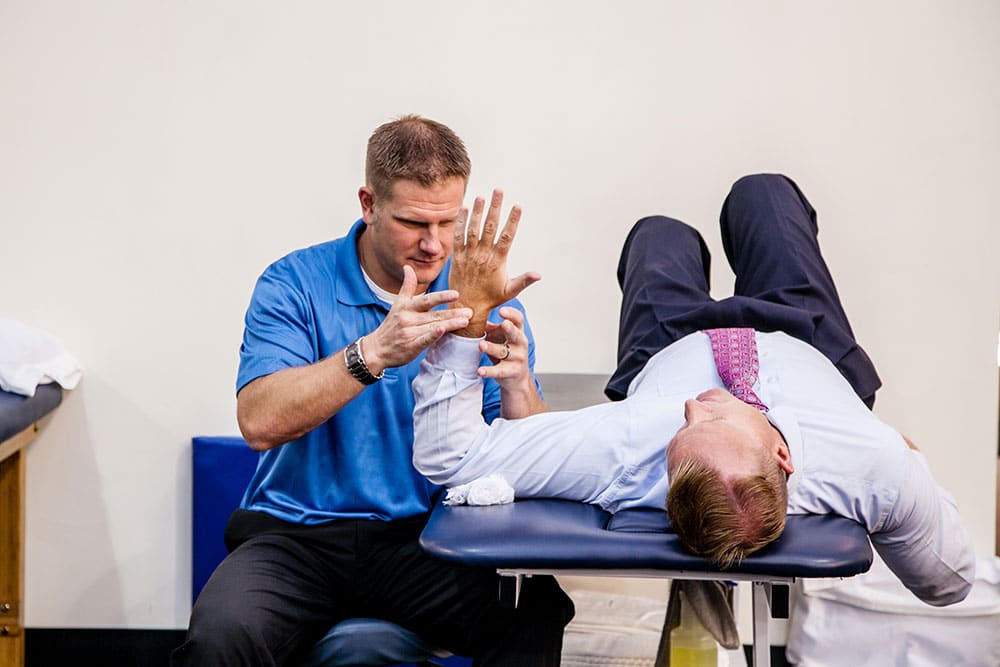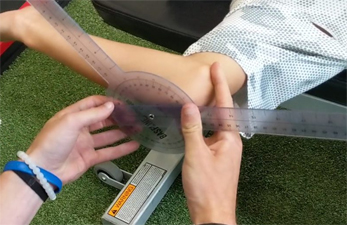The Importance of Communicating with Your Physical Therapist


The importance of physical therapy can’t be overstated enough, especially for athletes who have suffered physical injuries. If physical rehabilitation is so important, why are the results so mixed?
According to a study by Mary O’Keeffe at the University of Limerick, a number of factors influence the results. Some of these are obvious factors, such as the skill levels of physical therapists and the tools and facilities that they have access to.
However, the study also found that communication plays a key role in whether physical therapy is successful. This refers to communication from physical therapists to their clients, and vice versa. For that reason, communicating with your PT is vital in order to get the best results out of your treatment.
Communication Skills of a Physical Therapist
Before getting into the importance of your ability to communicate with your PT, you should understand that good communication is a two-way road. It’s just as important for a PT to communicate well with you as it is for you to communicate efficiently with him or her.
At Athletes’ Training Center, all of our physical therapists work hard to accurately communicate with you. In order to achieve this, they work on key communication skills.
Knowing Their Audience
Patients are people, and everyone is different. Your therapist must focus on the details that make you unique. Some of these include your gender, age, ethnicity and psychological factors, such as:
- Stress
- Hostility
- Depression
On paper, all patients might seem similar. However, everyone has different needs, so it’s up to therapists to spot these individual needs.
Talk in Easy-to-Understand Language
It’s easy for physical therapists to lose patients when they explain specific injuries. Because of that, it’s essential that they speak in easy-to-understand language. Helping patients understand their injuries and how to deal with them goes a long way toward overcoming those injuries.
Listening
Lastly, therapists have to know how to listen. In fact, patients want therapists who are willing to listen. A study by the National Institutes of Health showed that most patients are interrupted by health care professionals within 23 seconds of explaining their symptoms. You don’t want a therapist who interrupts the flow of information and ends communication in less time than it takes to heat up a TV dinner.
Improving Your Communication Skills
While it’s true that it’s important for your PT to accurately communicate with you, it’s just as crucial for you to communicate well with him or her. Without proper communication, you can’t accurately describe your injury, which may lead to improper treatment.
However, how do you improve how you communicate with your PT? Here are some tips that you can use.
1. Write Down Your Questions
It’s only natural to have questions. Sometimes, though, it’s hard to recall all of them on the spot. Before visiting your PT, write down the questions that you have, and then take them to your appointment. Asking questions shows your PT more about your level of knowledge regarding your injury.
2. Keep a Journal of Your Symptoms
Your PT will ask you about the symptoms you’ve been experiencing. The more accurately you can describe them, the better understanding that the therapist will have of your injury.
Your symptoms journal should include how the injury affects your day-to-day activity and a description of your daily life and activity level. Does your job require you to lift heavy objects? Do you sit at work, and if so, for how long each day? Some of your daily activities could negatively affect your injury and hinder the healing process. For that reason, your PT needs to be aware of everything that you do.
3. Know Your Goals
It’s important for you to be upfront with your PT about your goals too. Many people set unrealistic goals for themselves. Once they find out that they won’t reach those goals, their attitudes about physical therapy change. Knowing your goals can help your PT better understand what you expect from therapy.
Knowing What Not to Say
There are some things that you shouldn’t say when communicating with your PT. For example, you shouldn’t tell them, “You’re a great trainer.” A physical therapist isn’t a personal trainer. He or she is a licensed professional who has years of schooling.
Also, don’t oversell your pain. Physical therapists often ask, “How strong is the pain on a scale of one to 10?” Sometimes, patients will respond with a pain rating of 11. Doing that doesn’t accurately communicate your actual level of pain. In most cases, saying that your pain is a 10 indicates that you should be in the emergency room rather than physical rehabilitation. Keep that in mind the next time that you communicate with your therapist about your level of pain.
Knowing how you should be communicating with your physical therapist (and how they should be communicating with you) is only half the battle. The other half is finding a physical therapist that understands the importance of openness as much as you do. At Athlete’s Training Center, there is an emphasis of personal connection and communication among all of our physical therapy staff, and we are prepared to help you.
Don’t live with your injury any longer. Visit Athletes’ Training Center today so that our experts can start you on the road to recovery. Schedule your evaluation with us today!





Penelope Smith
March 4, 2020 at 5:19 amMy father is planning on getting knee surgery done on his left knee this August. He will need to do physical therapy after the surgery. So, I liked that you explained that if he doesn’t communicate with the therapist then he could make the problem worse especially if he is experiencing a lot of pain.
Jenna Hunter
June 8, 2020 at 8:11 pmThanks for explaining why it is so important to communicate with your physical therapist. I agree that you want to write down your questions when you have them so that you have them ready for your session. I’m looking for someone to help treat some chronic back pain, so I’ll have to check their qualifications first, especially when it comes to communicating.
Faylinn
July 29, 2020 at 4:55 pmMy mom has lived with chronic pain for 25 years and it is time that we find a physical therapist for her. She has always been very active but she suffered an accident when she was younger and has never been able to recover fully. I liked that you said that it is essential for physical therapists that they speak in easy-to-understand language.